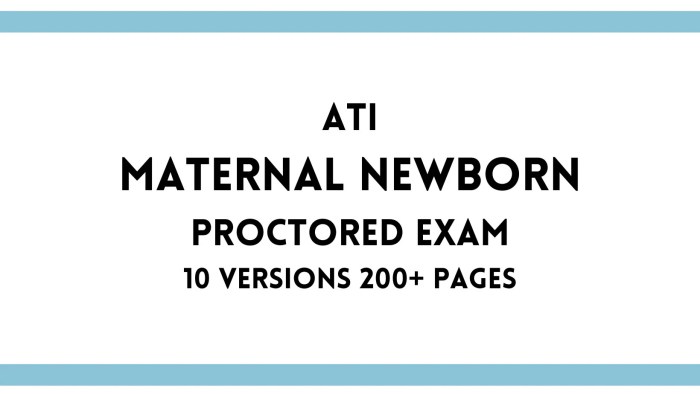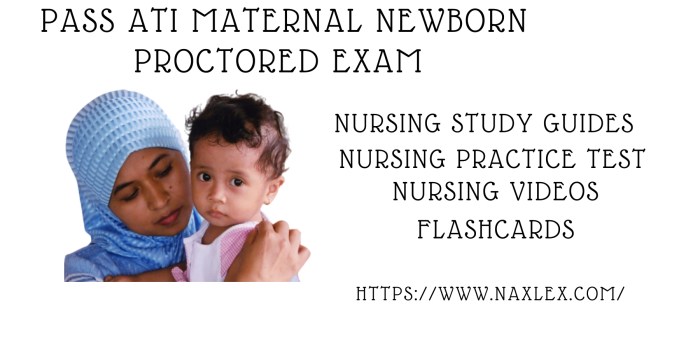The Maternal Newborn ATI Proctored Exam is a critical assessment for nurses specializing in maternal and newborn care. This comprehensive guide provides an in-depth overview of the exam, including its purpose, content areas, eligibility requirements, study resources, preparation strategies, test-taking techniques, content analysis, scoring interpretation, and frequently asked questions.
Exam Overview

The Maternal Newborn ATI Proctored Exam is a standardized assessment designed to evaluate the knowledge and skills of healthcare professionals who provide care to mothers and newborns.
The exam is a computer-based, multiple-choice test that covers a comprehensive range of topics related to maternal and newborn care, including:
- Antepartum care
- Intrapartum care
- Postpartum care
- Newborn care
The exam is designed for nurses, midwives, and other healthcare professionals who are seeking to validate their knowledge and skills in maternal and newborn care.
Study Resources

There are a variety of study materials available to help candidates prepare for the Maternal Newborn ATI Proctored Exam. These materials include:
- ATI’s Maternal Newborn Nursing Review Manual
- ATI’s Maternal Newborn Nursing Practice Questions
- Online study courses
- Study groups
It is important to choose study materials that are comprehensive and up-to-date. Candidates should also consider their own learning style and needs when selecting study materials.
Exam Preparation Strategies
To prepare for the Maternal Newborn ATI Proctored Exam, candidates should develop a structured study plan that allows them to cover all of the exam content in a timely manner.
Candidates should also use active learning techniques to enhance their knowledge retention. These techniques include:
- Reading the study materials actively
- Taking notes
- Completing practice questions
- Discussing the material with other candidates
In addition to studying the material, candidates should also take steps to manage stress and anxiety before and during the exam. These steps include:
- Getting enough sleep
- Eating healthy foods
- Exercising regularly
- Practicing relaxation techniques
Test-Taking Techniques
On the day of the exam, candidates should arrive at the testing center well-rested and prepared. They should also bring a valid ID and any other required materials.
Once the exam begins, candidates should take the following steps to maximize their performance:
- Read the instructions carefully
- Manage their time wisely
- Answer the questions to the best of their ability
- Review their answers before submitting the exam
Exam Content Analysis
| Content Area | Percentage of Questions |
|---|---|
| Antepartum Care | 30% |
| Intrapartum Care | 35% |
| Postpartum Care | 20% |
| Newborn Care | 15% |
The exam content is further broken down into specific topics within each content area. For example, the Antepartum Care section includes topics such as prenatal assessment, risk factors for pregnancy complications, and management of common pregnancy complications.
Exam Scoring and Interpretation
The Maternal Newborn ATI Proctored Exam is scored on a scale of 0-100. A score of 75 or higher is considered passing.
The exam results are provided in a score report that includes a breakdown of the candidate’s performance in each content area. The score report also includes a list of the candidate’s strengths and weaknesses.
FAQ Explained: Maternal Newborn Ati Proctored Exam
What is the purpose of the Maternal Newborn ATI Proctored Exam?
The exam assesses the knowledge and skills of nurses in providing care to mothers and newborns during the antepartum, intrapartum, postpartum, and newborn periods.
What are the eligibility requirements for taking the exam?
Nurses must have a current RN license and be employed in a maternal-newborn setting.
How can I effectively utilize study materials for the exam?
Create a study schedule, actively engage with the materials, utilize practice questions, and join study groups.
